Serena Williams’s five biggest moments of cultural impact
- Oops!Something went wrong.Please try again later.
- Oops!Something went wrong.Please try again later.
- Oops!Something went wrong.Please try again later.
- Oops!Something went wrong.Please try again later.
Serena Williams’s swan song reached its apparent finale on Friday evening.
After two emotionally charged victories in the opening rounds of the U.S. Open, Williams was defeated over three sets by Australian Ajla Tomljanovic.
Williams is expected to retire after her defeat in the Open, a competition she first won in 1999 at the age of 17.
In August, Williams said she would “evolve away from tennis” after this year’s tournament.
Williams has won 23 Grand Slam singles titles — more than any other player, female or male, in the open era. Her record gives her a stronger claim than anyone else to be the greatest tennis player of all time.
But she has always been more than just a sports star. A generation of women, especially Black women, have seen in her an inspiration and role model. And some of the most explosive issues in American life, especially relating to race and gender, have swirled around her for years.
Here are five of her biggest cultural moments.
Backing Black Lives Matter
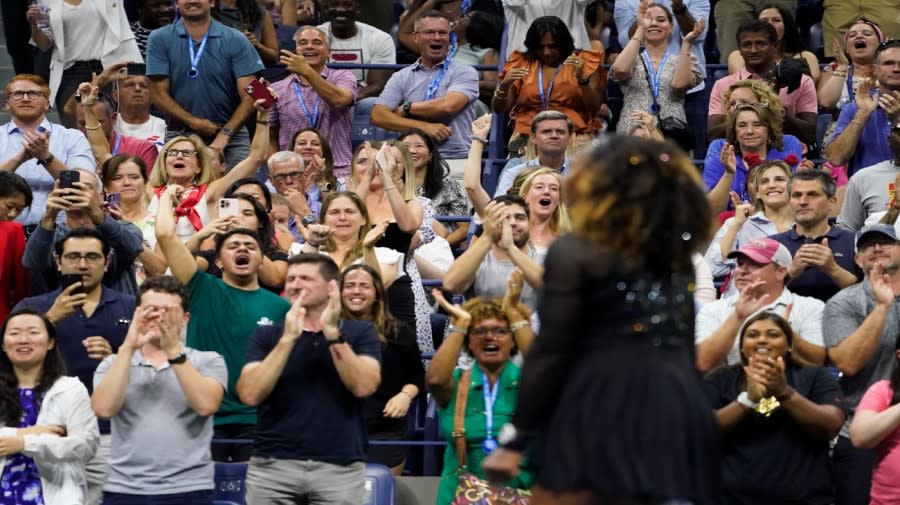
Williams does not align herself with party politics and has said in the past that she doesn’t vote. In 2016, she said her non-voting stance “goes back to my religion.” She is a Jehovah’s Witness.
But she has not avoided politics in the broader sense.
In 2015, she declared her support for the Black Lives Matter movement, and her solidarity with its activists.
“To those of you involved in equality movements like Black Lives Matter, I say this: Keep it up. Don’t let those trolls stop you,” Williams wrote in Wired magazine. “We’ve been through so much for so many centuries, and we shall overcome this too.”
She cast those views in the context of a bigger battle for equality — and her own status as a trailblazer.
“I’m a black woman, and I am in a sport that wasn’t really meant for black people,” she wrote.
In 2020, months after the police murder of George Floyd in Minneapolis sparked mass protests, Williams told British Vogue that a broader public beyond the Black community now saw “things that have been hidden for years; the things that we as people have to go through.”
She told the magazine that in the immediate aftermath of the killing of Floyd, “I had so many people who were white writing to me saying, ‘I’m sorry for everything you’ve had to go through.'”
“I think for a minute they started — not to understand, because I don’t think you can understand — but they started to see,” Williams added. “I was like: Well, you didn’t see any of this before? I’ve been talking about this my whole career. It’s been one thing after another.”
Abuse at Indian Wells — and the 14-year boycott that followed
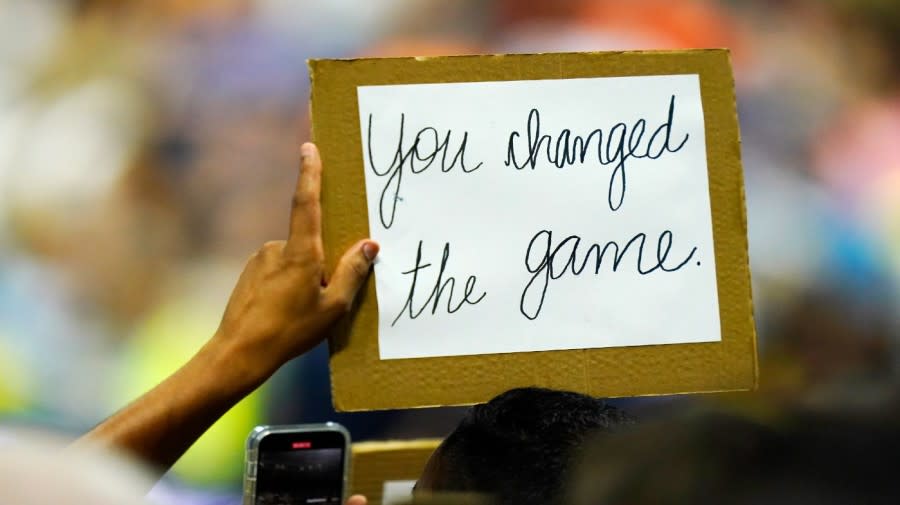
The Indian Wells Masters, held each spring in California, is considered the second-biggest tennis tournament in the United States after the Open. It’s sometimes known as the “fifth Grand Slam.”
But it has bad connotations for Williams and her family.
The story goes back to 2001.
Serena and Venus Williams were both competing in that year’s singles tournament. They ended up scheduled to meet in the semi-final.
A short time before the match, Venus withdrew, citing tendonitis. Deepening the controversy, a vanquished opponent of Venus’s, Russian pro Elena Dementieva, had implied that matches between the sisters were fixed by their father, Richard.
Serena won the final — but was booed by the crowd throughout. Richard Williams, watching the match, said he heard racial slurs being hurled.
In a 2015 article for Time magazine, Serena recalled the experience:
“The false allegations that our matches were fixed hurt, cut and ripped into us deeply. The undercurrent of racism was painful, confusing and unfair. In a game I loved with all my heart, at one of my most cherished tournaments, I suddenly felt unwelcome, alone and afraid.”
In that same article, she portrayed herself as haunted by the experience, saying she had a hard time forgetting “spending hours crying in the Indian Wells locker room … driving back to Los Angeles feeling as if I had lost the biggest game ever — not a mere tennis game but a bigger fight for equality.”
The 2015 Time magazine article was also a way to announce her return to the tournament.
She said that the widespread condemnation of a Russian official who had made “racist and sexist” comments about her had “reminded me how far the sport has come, and how far I’ve come too.”
There was to be no fairy tale ending, however.
Williams never won the tournament again, and its name still carries the stain from the way she and her family were treated in 2001.
Pregnancy highs and lows — and the importance of “being heard”
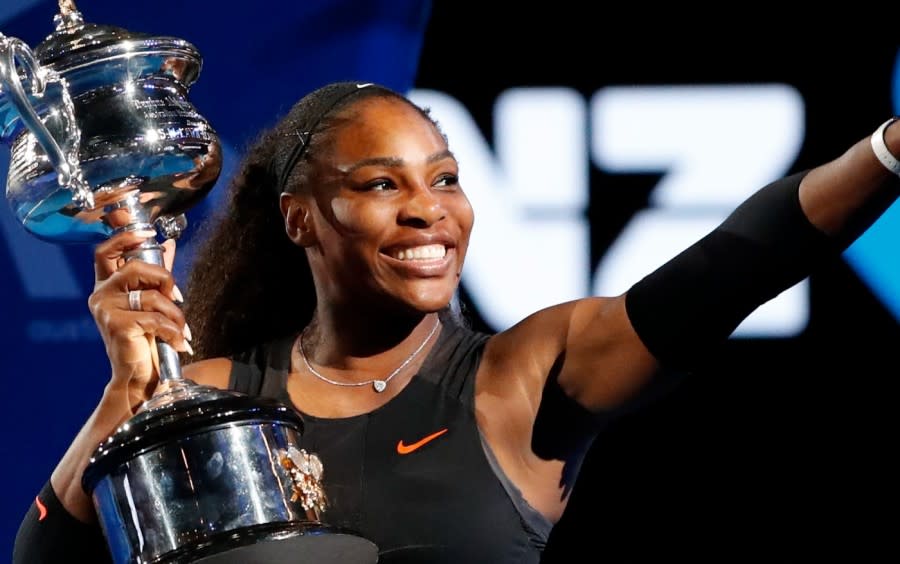
Most of Williams’s achievements have been played out in the full glare of the world’s media.
That was only partially true when she won her 23rd grand slam title, the Australian Open, in early 2017.
What Williams knew but the rest of the world did not was that she was pregnant at the time.
She had found out about her pregnancy two days before the tournament began. Aged 35, she won every match in straight sets, defeating Venus in the final. Her daughter Olympia was born in September 2017.
The aftermath of the birth was traumatic — and eye-opening.
Williams, who had previously suffered from blood clots, recalled in an essay how, immediately after Olympia’s birth, “I couldn’t get out of bed because my legs were still numb.”
She began passing out, and, in moments of semi-lucidity, asked medical staff for a particular kind of drip — heparin — used to treat blood clots.
In her essay, reprinted in Elle magazine in April this year, Williams described her pain intensifying and being wracked with coughs.
She swore that one nurse told her she was talking “crazy” when she demanded to get a CT scan and that “another doctor was supposed to be checking in but I didn’t see him very much. In fact, I saw him only once.”
Williams plainly believes her concerns were dismissed, despite her exalted status, in a way that put her life in danger.
“In the U.S., Black women are nearly three times more likely to die during or after childbirth than their white counterparts,” she wrote in Elle.
“Many of these deaths are considered by experts to be preventable. Being heard and appropriately treated was the difference between life or death for me; I know those statistics would be different if the medical establishment listened to every Black woman’s experience.”
Fighting for equal prize money for women
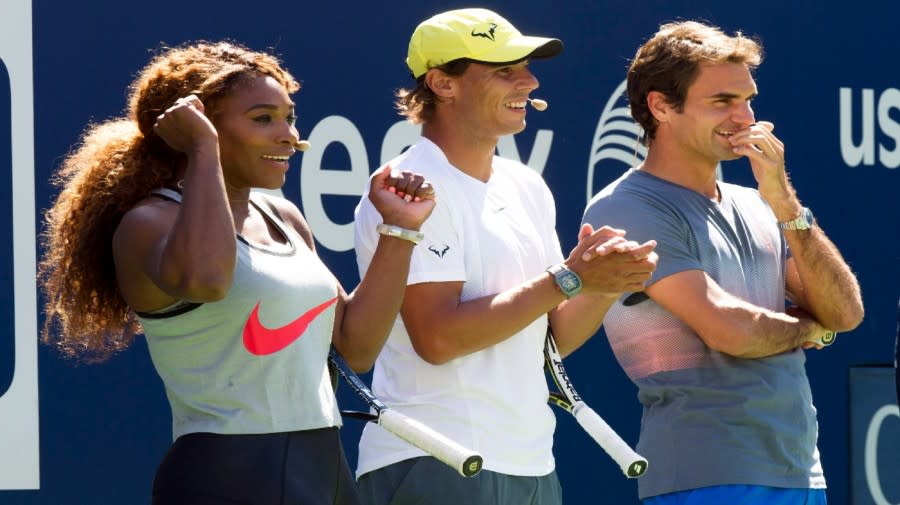
Williams has seen real change over the arc of her career.
She has strongly advocated that prize money for women should be the same as for men — a goal that was distant when she began as a pro.
Equity in tennis prize money has been improving — Wimbledon instituted equal prize money in 2007, a push that was, in large part, spearheaded by her sister Venus. By 2007, Serena Williams had already won the grass-court competition twice. The U.S. Open had instituted equal pay a generation before.
But disparities remain outside of Grand Slam tournaments — and Williams’s focus is broader than tennis in any case.
In a 2016 interview with Glamour magazine, she was asked about the quest of the U.S. women’s soccer team for equal pay.
“These sports have a lot of work to do. And I really hope that I can be helpful in that journey because I do believe that women deserve the same pay,” Williams said.
“We work just as hard as men do. I’ve been working, playing tennis, since I was 3 years old. And to be paid less just because of my sex — it doesn’t seem fair.”
A New York Times story the same year reported that women playing professional tennis earned about 80 cents to every dollar their male counterparts were paid.
Williams had already talked about the disparities back in 2012, in a post-match press conference at Wimbledon.
“I deserve to get paid the same amount. I don’t deserve less ‘cos I have boobs and they don’t. That’s definitely not the case. I worked just as hard since I was 3,” Williams said. “I definitely know my whole life has been dedicated toward being a top athlete, and I shouldn’t get paid less because of my sex.”
Calling out double standards
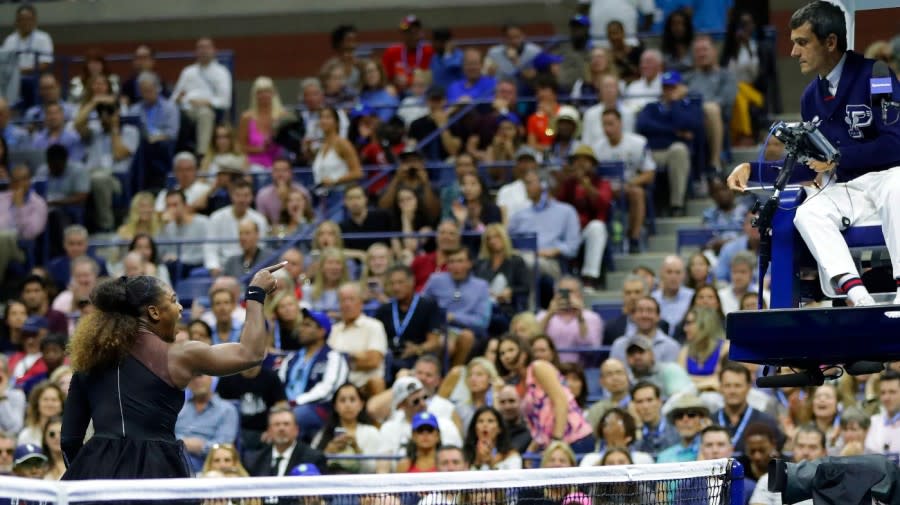
Williams’s cultural import can’t only be measured out in specific moments.
Her entire career has had a long-term impact on a whole host of complex topics, from body image to racial and gender stereotyping.
As her career has gone on, she has become more willing to frontally attack what she sees as double-standards or basic inequalities — including about her imminent retirement.
In the Vogue story where she announced her shift away from tennis — a shift motivated in part by a desire to have more children — she wrote: “Believe me, I never wanted to have to choose between tennis and a family. I don’t think it’s fair. If I were a guy, I wouldn’t be writing this because I’d be out there playing and winning while my wife was doing the physical labor of expanding our family.”
On the court, Williams has sometimes got into verbal altercations with umpires and line judges — episodes that she and her fans believe get undue attention and punishment because of her race and gender.
In March of this year, Williams noted that a male player, Alexander Zverev, had recently hit an umpire’s chair with his racket.
“I would probably be in jail if I did that,” Williams told CNN’s Christiane Amanpour. “Like, literally, no joke.”
She returned to the subject of sexist double-standards just before the Open began, in a podcast interview with Meghan Markle.
“I have to win being Serena. And sometimes that’s more fierce,” she told Markle. “But is it fierce when guys are saying ‘come on’ and pumping their fists? It’s pretty exciting, but for me it’s ‘aggressive.’”
In that same interview, Williams offered a farewell of sorts as she prepared to bring down the curtain on her epic career.
“I’m just from Compton. I never envisioned that this would be me, you know?,” she said. “I was just the youngest of five in a two-bedroom home.”
For the latest news, weather, sports, and streaming video, head to The Hill.

